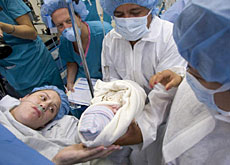Breastfeeding wins mothers’ approval

New mothers in Switzerland are breastfeeding more and for longer than ten years ago, according to a Federal Health Office-sponsored study.
The office said that this was mainly due to a campaign to promote mothers’ milk. But it warned there was still work to be done to comply with international breastfeeding guidelines.
The study, carried out by Basel University’s Institute for Social and Preventative Medicine, was conducted in 2003 among almost 3,000 mothers living in Switzerland. The results were published this week.
In all, the survey found that 94 per cent of newborns were breastfed, two per cent more than in 1994, when the last report was carried out.
Babies also received their mothers’ milk for longer – 31 weeks in 2003 compared with 22 weeks ten years previously.
Promotion
“The increase is among other things due to an increased promotion of breastfeeding in Switzerland through the spread of the Baby Friendly Hospital Initiative (BFHI) and information measures,” the health office’s Anna Sutter-Leuzinger told swissinfo.
The BFHI, coordinated by the Geneva-based World Health Organization and Unicef, was introduced in Switzerland in 1993 to ensure that hospital maternity units become centres of breastfeeding support.
In 2000 the health office set up the Swiss Foundation for the Promotion of Breastfeeding, which promotes the BFHI scheme, and also provides support and information.
Sutter-Leuzinger said that the importance of breastfeeding was slowly being acknowledged in Switzerland and that help for nursing mothers had improved.
More action needed
But she said more needed to be done if Switzerland was to comply with WHO guidelines, which advocate “exclusive breastfeeding” – mother milk and no other foods or liquids – until six months.
“Just 14 per cent of newborns in Switzerland are still exclusively breastfed at six months,” said Sutter-Leuzinger.
“A basic change in the value attached to breastfeeding is necessary in all levels of society, so that the WHO recommendations can be attained.”
Certain groups also need to be targeted, she added, as the survey had revealed that migrants, smokers, the overweight and those with a lower level of education tended to breastfeed less.
40 per cent
Anne Endrizzi from the Swiss Foundation for the Promotion of Breastfeeding, told swissinfo that the goal was that by 2008 at least 40 per cent of infants aged six months would still receive mother’s milk as their main source of nutrition.
The foundation has defined seven other goals to be fulfilled during this time, including breastfeeding being recognised as a norm in employment legislation.
But Endrizzi pointed out that Switzerland still ranked well compared with other countries when it came to breastfeeding.
The Swiss health authorities consider mother’s milk to be the best nutrition for infants during their first months.
The official view is that breastfed babies tend to suffer from fewer infections and generally have better cognitive development than their bottle-fed counterparts.
swissinfo
The WHO uses the following definitions:
Exclusive breastfeeding: the infant only receives breast milk and no other liquids or solids.
Full breastfeeding: the infant’s predominant source of nourishment is breast milk. It may receive water or water-based fluids, but no food-based substances.
Breastfeeding: the child receives breast milk.
Complementary feeding: the child receives both breast milk and solid or semi-solid foods.
The WHO and Unicef launched the Baby Friendly Hospital Initiative in 1991.
A maternity facility is designated “baby-friendly” when it does not accept free or low-cost breastmilk substitutes, feeding bottles or teats, and has implemented ten specific steps to support successful breastfeeding.
These steps include a written breastfeeding policy that is communicated to staff, informing mothers of the benefits of breast milk for their babies, and encouraging new mothers to start breastfeeding within the first half-hour of birth.
In Switzerland 59 hospitals and clinics and two maternity units have received Unicef’s “Baby Friendly Hospital” label.

In compliance with the JTI standards
More: SWI swissinfo.ch certified by the Journalism Trust Initiative










You can find an overview of ongoing debates with our journalists here . Please join us!
If you want to start a conversation about a topic raised in this article or want to report factual errors, email us at english@swissinfo.ch.